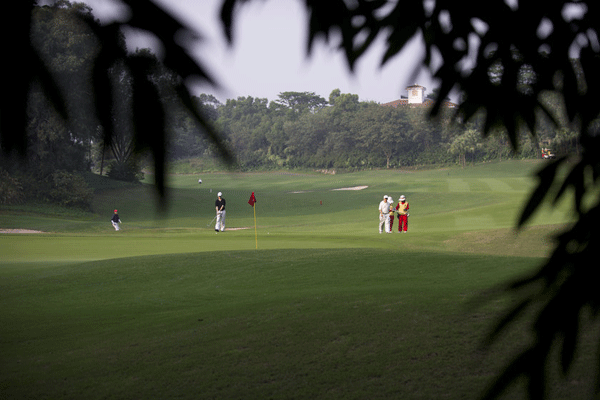The government is cracking down on illegally constructed courses in an attempt to promote environmental protection and regulate the industry, report Cao Yin in Beijing and Chen Hong in Shenzhen, Guangdong.
|
 |
|
People play golf on the fairway at the Mission Hills Golf Club in Shenzhen, Guangdong province. Local authorities are investigating golf clubs nationwide as part of a government crackdown on developers contravening a ban on the construction of new golf courses. [Photo/cfp] |
Mr Sun, a senior administrator at a golf club in Beijing, has no idea if he will still have a job in March because the club is the subject of an official investigation and faces closure.
"I heard the Beijing government is investigating all the golf courses in the capital, and any found to have been built illegally will be closed," said Sun, who declined to give his full name.
Although he is unsure whether the club in the Changping district will close, he said that as of Dec 21, the course will only be open at weekends.
"The final decision won't be known until March 1 because the inspection is still ongoing, but if we're forced to close, we'll move by the end of May," he said.
Golf is rapidly becoming big business in China, where even middling clubs in the capital charge about $100 per round. About 1 million people play the game regularly, and the number of enthusiasts is rising by about 10 percent every year, according to a 2013 white paper released by Chaoxiang Group, a professional golf management company. By 2013, there were 639 accredited golf courses in China, up from the 432 registered in 2009.
The sport's popularity comes in part from its perceived exclusiveness in a nation where incomes are rising every year, and partly from the examples set by some of the country's younger players, such as Guan Tianlang, who last year at age 14 became the youngest player ever to compete in the US Masters tournament, and Feng, Shanshan, 25, who won the 2012 LPGA Championship and became the first Chinese player of either gender to win a major competition.
However, in July a number of government departments, including the National Development and Reform Commission and the Ministry of Land and Resources, announced plans to regulate the industry, according to Time Weekly in Guangdong.
Since the announcement, investigations have started nationwide into the origins of the rash of clubs that seem to have sprung from nowhere in recent years, despite a nationwide ban on their construction that came into force in 2011.
'Problematic' permits
Following the inspections, some clubs have had "problematic" building permits withdrawn, while others have been ordered to restore illegally appropriated land to its original condition, especially if it contains verified sources of drinking water or is part of a natural protection area. Courses found to have been constructed illegally will be closed immediately, according to the Time Weekly report.
Fan Kai, a former editor of Golf magazine who is now a media figure in the industry, said regulation is necessary because of the large number of courses that have been built illegally during the past decade and are damaging the sport's image. Some of the courses were even built at the insistence of local governments, which intended to use the clubs to attract investment and boost the local economy, according to Fan, who believes the inspections will clean up and improve the industry.
Unlike Sun's club in Beijing, Mission Hills Golf Club in Shenzhen, Guangdong, is under no threat. "We've assisted with the inspection conducted by the local government, and provided the officials with all the relevant documents about construction and our operations," Yang Tingting, the club's publicity officer, said.
Some sections of the course, which opened in 1990, have been identified as water-source protection zones, "so we are cooperating with the government in the inspection", she said, adding that the club obtained official planning permission long before construction of the course began.
So far, 15 courses in Shenzhen have been inspected, and five of them, including Mission Hills, have been ordered to hand back land officially designated as environmental protection areas, she said.
The remaining clubs will be required to comply with a rectification plan drawn up by the local government.
Similar inspections were carried out at five clubs in Shenyang, the capital of Liaoning province, resulting in two of them receiving orders to close by the end of November. Some of the city's courses will be returned to their natural state, while others, such as the Shenshuiwan Golf Club, will be transformed into public gardens, according to the Shenyang Daily.
